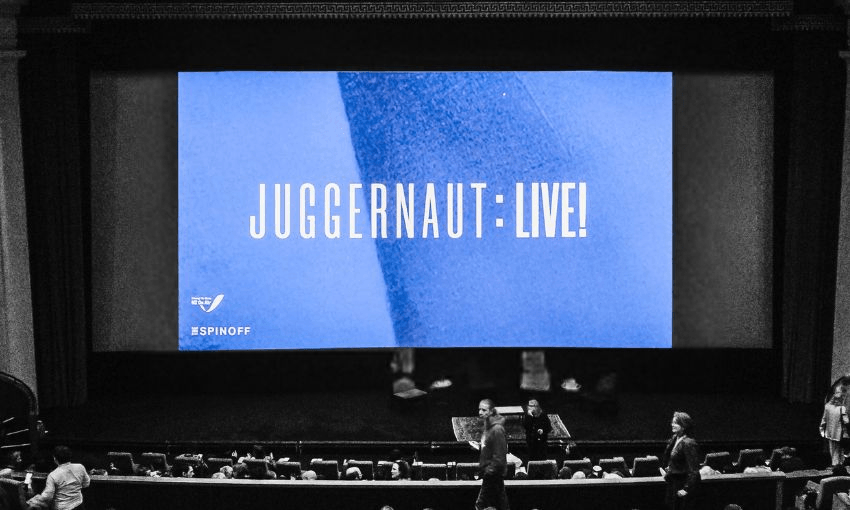Chris Bishop on ditching MMP, Linda Clark on waiting for Winston and plenty more from Wellington’s one-night-only trip back to the 90s.
On Thursday night, Wellington’s Embassy theatre was heaving with political nerds. The crowd was a mix of people who clearly remembered the 90s and those who didn’t, people aligned with the Act Party and with the Greens, normies and Ruth Richardson. But they were all there for the same reason: to be soothed by the dulcet tones of Toby Manhire talking about the budgets and fiscal holes of the 1990s for the launch of Juggernaut 2. In other words, it was the most Wellington event to ever happen in Wellington.
It could’ve been a silent disco where a bunch of political dorks “gurned out” to the hit 1990 campaign song ‘Positive Action’, or one of those gimmicky events where you listen to an entire album (podcast episode, in this case) while lying down in the dark. But better than all that, it was a panel discussion between Manhire, former TVNZ political editor Linda Clark, former RNZ Māori issues correspondent Chris Wikaira and National minister Chris Bishop.
Couldn’t make it? Here are the five most important moments you missed.
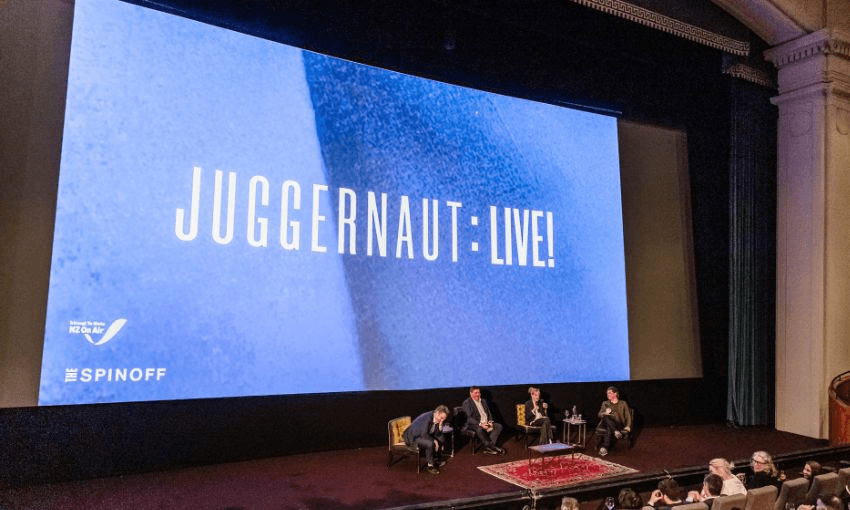 On stage from left, Chris Bishop, Chris Wikaira, Linda Clark and Toby Manhire (and you might even be able to spot David Seymour in the front row (Photo: Shannon Doyle)
On stage from left, Chris Bishop, Chris Wikaira, Linda Clark and Toby Manhire (and you might even be able to spot David Seymour in the front row (Photo: Shannon Doyle)
Given the choice, Chris Bishop wouldn’t keep MMP
Bishop was but a 13-year-old at the time of the 1996 election, the first to be held under the mixed member proportional electoral system, and back then, the biggest political issue in his life was puberty. He remembers the kingmaker’s first rodeo clearly, though. “It’s just instilled in my memory, watching the 6pm news in our old house in King’s Crescent in the Hutt, as Mr Peters came to do the big reveal. Everyone said, well, that’ll never happen again.”
MMP has undoubtedly brought us many joys since then, like the entire plotline of the 1999 documentary Campaign, or that iconic photo of Christopher Luxon, David Seymour and Winston Peters all smiling through the pain. But would Bishop vote to keep MMP, should a referendum be held again?
“On its face, MMP has a lot going for it, right? Because the simple thing that people focus on is it’s fair … And it’s done a lot of good things. It’s made our parliament more diverse, made it more representative. That’s definitely true,” Bishop said. “I’ve got mixed views about it. I mean, I voted to change when we did the referendum [in] 2011. I’d probably vote to change it again.” It was a bold thing to say with his coalition partner, Act Party leader David Seymour, sitting in the front row.
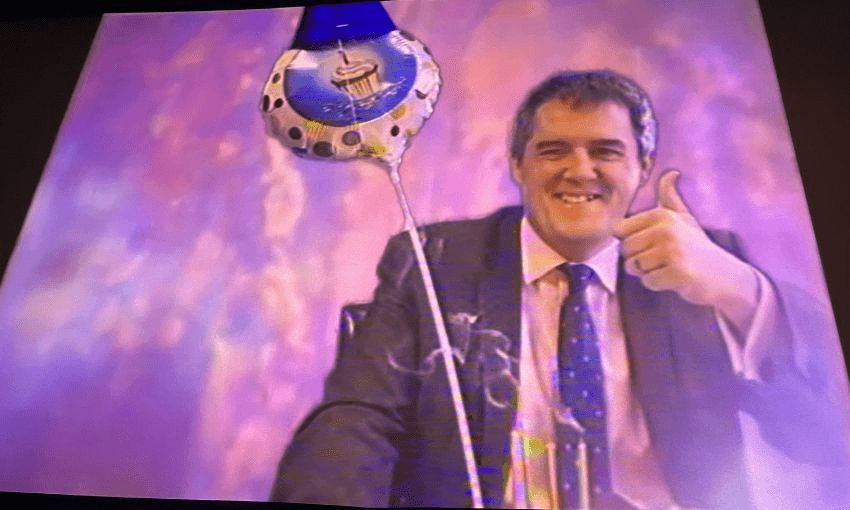 Chris Bishop, in 90s graphic glory on the big screen
Chris Bishop, in 90s graphic glory on the big screen
Bish didn’t want to talk about that budget
Former finance minister Ruth Richardson and her “mother of all budgets” loom large in any memories of the fourth National government. That 1991 budget – its nickname coined by Richardson at the time after some prodding from Frontline host Ross Stevens – is the focus of the second episode of Juggernaut 2, and remains a painful memory for many New Zealanders.
Asked where that budget sits in terms of the modern National Party’s proudest moments (or not), Bishop answered: “There are a lot of things that annoy me about the Labour Party.” Which is fair, you know, because they did “cook the books”, but also they should be proud about their work through 1984 to 1990, because they were “almost certainly the best government we’ve ever had”, Bishop reckoned.
But wait, what does this have to do with Richardson and her budget? Undeterred by the classic political move of not answering a question and giving a really long spiel about something else instead, Manhire pressed Bishop for an answer. And eventually, encouraged by some scoffs from the crowd, Bishop delivered.
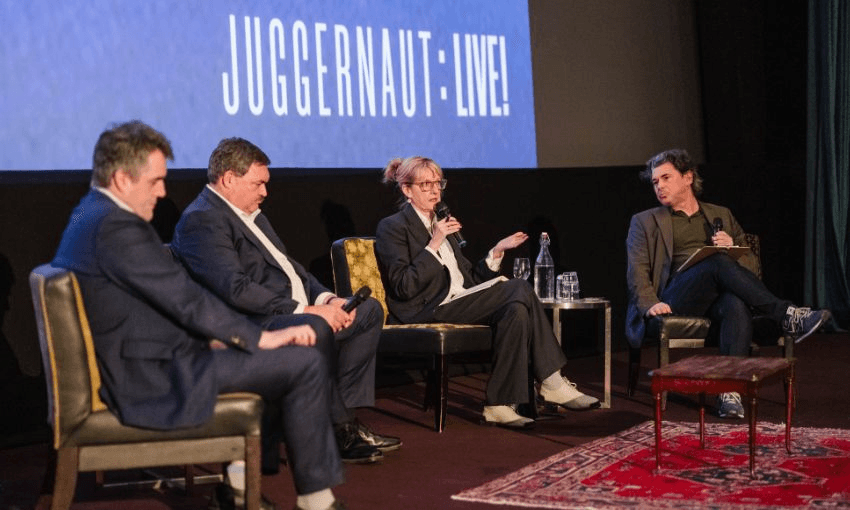 It took some time, but Bishop managed to answer the question (Photo: Shannon Doyle)
It took some time, but Bishop managed to answer the question (Photo: Shannon Doyle)
“All political parties are proud of what they’ve done in the past up to a point … I think like most New Zealanders, many people in the National Party would have a mixed feeling about 1990 through 1993,” Bishop said. “We don’t really talk about the Muldoon years in the National Party any more. No one goes out there saying, ‘remember the 1980s budget when we froze wages and prices? That was cool.’”
But the most illuminating conversation about the 1991 budget came from Linda Clark, and how cuts forced her mother, who was on the benefit, “to penury”. “I don’t want to sound like John Key, but I grew up in a state house,” Clark told the crowd, to laughter. “I grew up in a family that didn’t have a lot of money … The mother of all budgets gutted people like my relatives.”
“Well-intentioned policy often has really terrible impacts. And one of the things about the relationship with Jim Bolger and Ruth, it always seemed to me, is that he was discomforted by that quite quickly,” Clark said. “He went along with it: they needed to do it, there was no question. Politics is hard. Politicians have to make very difficult decisions, often when there isn’t enough money.”
Clark saw Mike Moore’s coup in action
As one punter rightly observed, the sole woman on the panel was the one the audience liked the best. Clark spoke at length about the press gallery of days gone by, and though the following is technically a yarn related to the first season of Juggernaut, it’s still a good one.
“The relationship between journalists and politicians was so different [in the 80s/90s] that when Mike Moore did the coup [to oust] Geoffrey Palmer, I literally was allowed in his office for the week before the coup with a camera,” Clark said. The team signed an NDA, and promised to get rid of the footage if the coup never came to fruition, but Clark had a good feeling it would: Helen Clark let herself be filmed for the segment.
These days, you’re more likely to see a coup being planned over Instagram.
 Chris Wikaira, Linda Clark and Toby Manhire (Photo: Shannon Doyle)
Chris Wikaira, Linda Clark and Toby Manhire (Photo: Shannon Doyle)
‘Every single day there was a photo opportunity of nothing’
Clark also charmed the crowd with memories of the two months spent waiting for Winston Peters to choose which party to form a government with after the first MMP election in 1996. it was “a crazy, crazy time”, she said. “Every single day there was a photo opportunity of nothing.”
She recalled running into Peters decades later, at the Boulcott Street Bistro, by which time she’d become a lawyer. “I went up and said, ‘oh my God, Winston’; cause I have spent so much of my life waiting for this man. And not in that way. And he stroked my hand and said, ‘congratulations on taking the law’.”
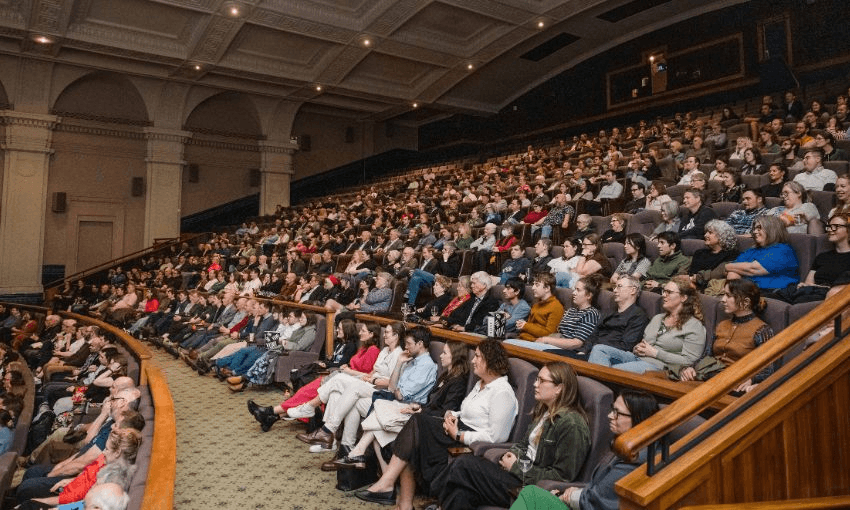 Wellingtonians showing up and showing out (Photo: Shannon Doyle)
Wellingtonians showing up and showing out (Photo: Shannon Doyle)
The memories of the 1996 election and Peters brought Chris Wikaira’s mind back to snooping on a 1998 hui at Auckland airport involving NZ First’s “tight five” Māori electorate MPs, Tuku Morgan, Tau Henare, Tuariki Delamere, Rana Waitai and Tu Wylie, soon before the coalition fell apart and most of them quit the party. They were discussing rumours that NZ First was holding a fifth birthday party in Tauranga, and they weren’t invited.
“Tuariki got very quiet, and he sat there and he looked out the window and said, ‘the boss doesn’t want us there, does he?’ And I think that for those Māori MPs, that was the key moment where it was past the point of no return,” Wikaira said.
Doug Graham tugged at the heartstrings
In a strange twist of events, a clip of former Treaty negotiations minister Doug Graham reflecting on the Ngāi Tahu Claims Settlement Act (which became law in 1998) provided the most emotional moment of the night. Graham remembered speaking with a man who had spent a whole day sobbing after the negotiations.
“He said, ‘I was brought up by my grandfather and we survived by farming the road sites. And I went to school the long way on foot because I could go past the horse trough and there was some molasses in there and I had that for breakfast,’” Graham said, getting weepy. “My whole team were in tears. You just wonder sometimes, how could this happen?”
